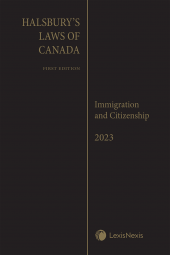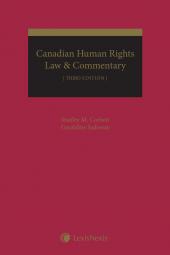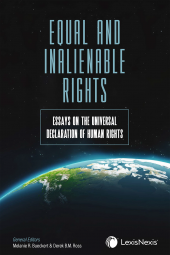The Canadian Handbook on International Humanitarian Law
One Year Subscription Only Terms
Subscribers receive the product(s) listed on the Order Form and any Updates made available during the annual subscription period. Shipping and handling fees are not included in the annual price.
Subscribers are advised of the number of Updates that were made to the particular publication the prior year. The number of Updates may vary due to developments in the law and other publishing issues, but subscribers may use this as a rough estimate of future shipments. Subscribers may call Customer Support at 800-833-9844 for additional information.
Subscribers may cancel this subscription by: calling Customer Support at 800-833-9844; emailing customer.support@lexisnexis.com; or returning the invoice marked 'CANCEL'.
If subscribers cancel within 30 days after the product is ordered or received and return the product at their expense, then they will receive a full credit of the price for the annual subscription.
If subscribers cancel between 31 and 60 days after the invoice date and return the product at their expense, then they will receive a 5/6th credit of the price for the annual subscription. No credit will be given for cancellations more than 60 days after the invoice date. To receive any credit, subscriber must return all product(s) shipped during the year at their expense within the applicable cancellation period listed above.
Product description
Canada’s approach to war has shaped the way in which it interprets and implements international humanitarian law (IHL), or the law of armed conflict as it is also called. The Canadian Handbook on International Humanitarian Law provides a useful “first stop” for the Canadian legal community on key topics in international humanitarian law, in a way which pays particular attention to Canadian sources, interpretations, applications and practices where they exist and are publicly available.
At the same time, given the iterative nature of the development of international law, especially customary international law, the book will also be useful to practitioners and scholars internationally. Indeed, despite the paucity of publicly available material, Canada has been a regular actor in this area of law and its contributions to the development of international humanitarian law should be highlighted.
Throughout The Canadian Handbook on International Humanitarian Law, the authors address the relationship between theory and practice, the implications and challenges of operating with partners and allies, and tensions between different state, civil society and critical perspectives. The authors aim to provide useful guidance and indicate Canadian resources for all engaged with international humanitarian law issues, from the field to the courtroom, and to the classroom.
The handbook also addresses the interplay between international humanitarian law and other relevant legal regimes, notably international human rights law and international criminal law. In a moment when international humanitarian law issues have garnered the attention of the public, as well as specialists, this handbook is timely and essential reading.
Topics Covered
- Treaties
- Customary International Law
- Soft Law
- International and Non-International Armed Conflict
- Canada and Conflict Classification
- Military Necessity
- Protection of Civilian Populations from General Effects of Hostilities
- Deprivation of Liberty
- Missing Persons
- Weapons, Means and Methods of Warfare: Cyberspace and Emerging Technology
- Naval Warfare
- The Role of States, Non-State Armed Groups and International Organizations
- The Implementation of the Obligation to Respect and Ensure Respect for IHL by Canada
- The Suppression and Repression of Violations of IHL
- Criteria for Arms Transfers
Who Should Read This Book
Human rights lawyers, judges, IHL specialists in the Canadian Forces, charities, NGO’s, activists, law students and scholars will rely on this handbook to be the go-to source for international humanitarian law application and interpretation in Canada.
Table of contents
Chapter 1: Introduction
Chapter 2: Sources of International Humanitarian Law
Chapter 3: The Scope of Application of International Humanitarian Law
Chapter 4: Overarching Legal Principles
Chapter 5: Protection of Persons
Chapter 6: The Conduct of Hostilities
Chapter 7: Respecting and Ensuring Respect for the Law
Chapter 8: Interplay of International Humanitarian, Human Rights and Criminal Law
Index
 Lexis Nexis
Lexis Nexis 


